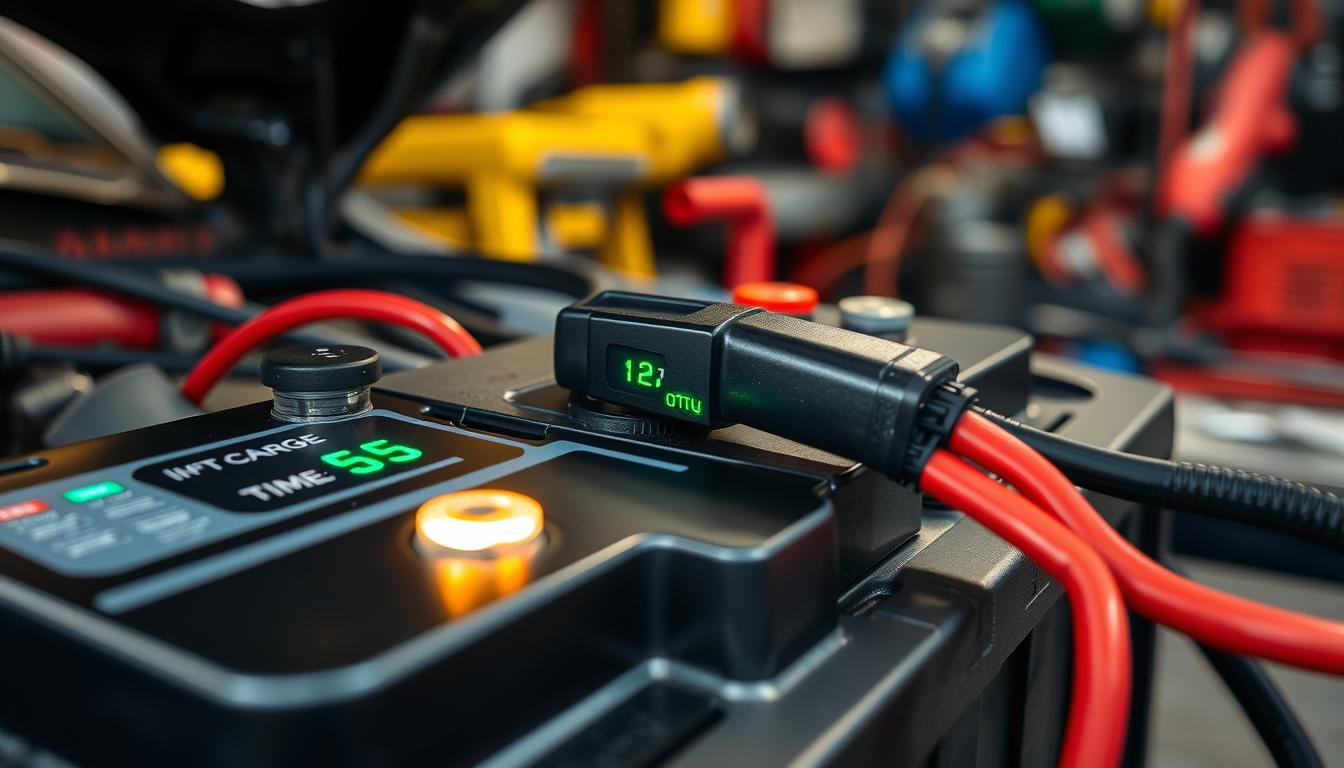Knowing how long it takes to charge a car battery is key for drivers. It can take from one hour with a high-output charger to 24 hours with a trickle charger. Driving at highway speeds for four to eight hours can recharge the battery to 75-80%.
The charger type, battery size, and condition affect charging time. Ignoring this can lead to longer charging times or damage the battery.
Key Takeaways
- Charging with a 20-amp charger takes approximately 2.5 hours for a full charge.
- Highway driving can recharge a car battery to 75-80% in about eight hours.
- Trickle chargers may require up to three days for a complete charge.
- Older batteries may take longer to charge or might not charge fully.
- For optimal charging, turn off non-essential electronics while driving.
Understanding Car Battery Basics
Knowing about car batteries is key for car owners. It’s important to know the different types of batteries. This helps choose the right one for your car. Also, understanding how batteries work is crucial for their long life and good performance.
Types of Car Batteries
There are many types of car batteries available. Each has its own purpose. Here are a few common ones:
- Lead-Acid Batteries: These are traditional and used in most cars.
- Lithium-Ion Batteries: These are popular in electric cars because they are light and efficient.
- Absorbent Glass Mat (AGM) Batteries: These are made for deep cycling and are often in luxury cars.
How Car Batteries Work
A car battery stores energy in a chemical form. It turns this energy into power when needed. This is important for starting the engine and running electronics when the car is off. Knowing how batteries work helps keep them in good shape. This ensures they charge properly.
Factors That Affect Charging Time
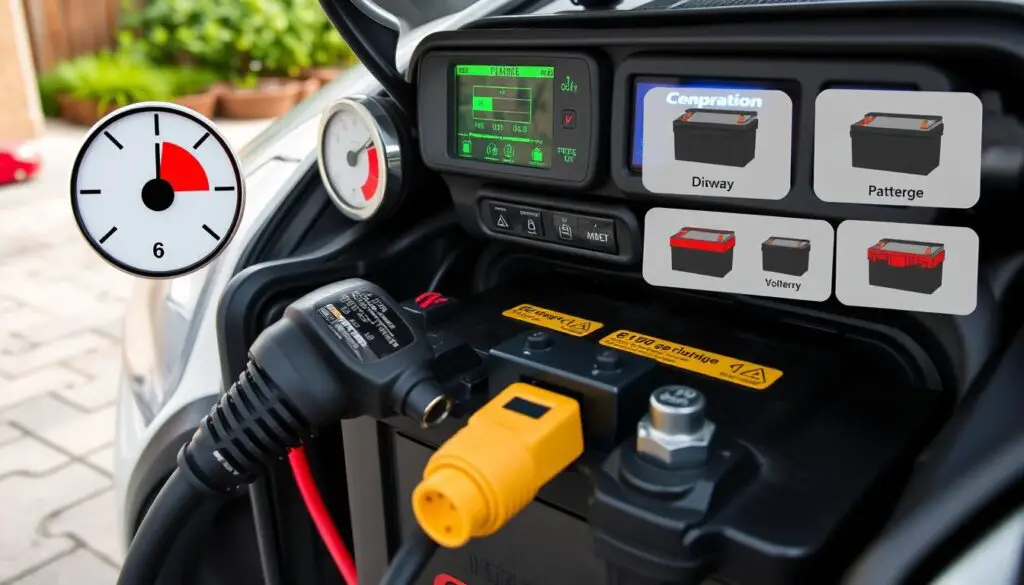
Charging a car battery can take different times. Knowing what affects this time can help you charge faster and keep your car running well.
Battery Size and Capacity
The size and capacity of a car battery matter a lot. A battery’s capacity is measured in amp-hours (Ah). For example, a 52Ah battery takes about 10 hours to charge if it’s empty.
Bigger batteries take longer to charge than smaller ones. Also, if a battery is almost empty, it takes more time to charge than if it’s just a little low. Knowing the battery size helps guess how long it will take to charge.
Charger Type
The type of charger you use can change how fast your battery charges. Standard chargers give 4 to 8 amps. High-output chargers can give 20 amps or more, making charging faster.
Car batteries usually charge at 4 amperes. There are different chargers:
- Linear chargers: These are cheap and small but charge slowly.
- Multi-stage chargers: Also called smart chargers, they check the battery and charge it right.
- Trickle chargers: These charge very slowly but safely, helping the battery last longer.
Knowing about charger types helps drivers choose the best one. The size of the battery and the charger type both affect how fast it charges.
| Charger Type | Output Amperes | Estimated Charging Time for 52Ah Battery |
|---|---|---|
| Slow Charge (2A) | 2 Amps | ~25 hours |
| Medium Charge (10A) | 10 Amps | ~5 hours |
| Fast Charge (20A) | 20 Amps | ~2.5 hours |
Charging Methods Overview
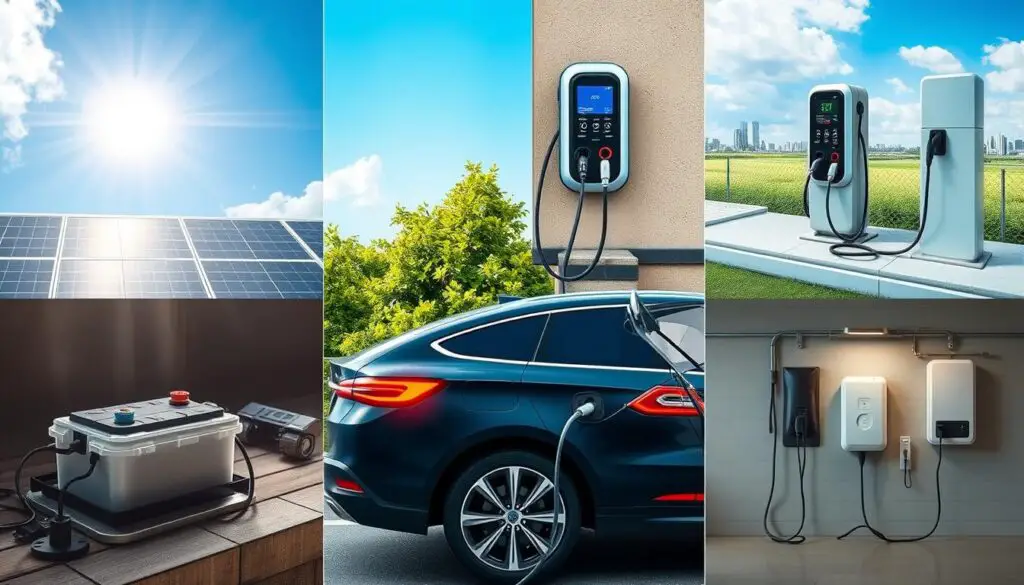
It’s key to know about different car battery charging ways. Each method has its own benefits and how long it takes. You need to pick the best one for your battery and how you use your car.
Standard Wall Charger
The standard wall charger is a top pick for most car batteries. It charges slowly, which is safe for overnight use. The time it takes to fully charge varies, but it’s usually 10 to 24 hours.
Many people use it for regular care. It keeps the battery in top shape.
High-Output Charger
A high-output charger charges batteries fast. It cuts down the time to 1 to 3 hours. It’s great for quick battery boosts.
But, be careful. Fast charging can overheat the battery. Always watch it closely.
Solar Chargers
Solar chargers are good for the planet. They use the sun’s power to charge batteries. They’re perfect for outdoor lovers or those without power outlets.
Charging takes days, depending on the sun and the battery’s state. But, they’re a solid choice for keeping batteries alive, even without power.
Charging Times for Different Battery Types
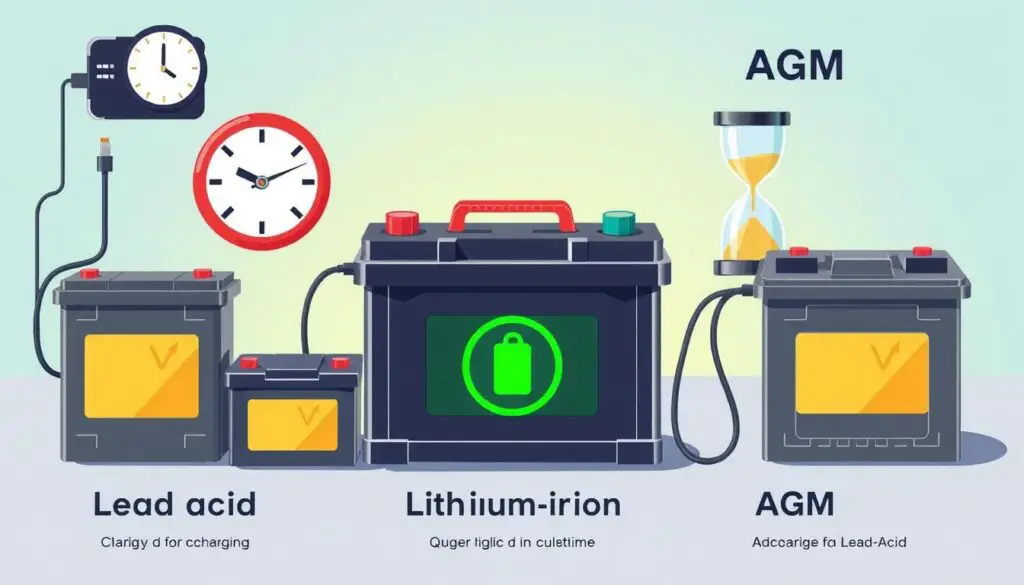
Knowing how long it takes to charge different batteries is key. Each type charges at its own pace. Here’s a look at charging times for lead-acid, lithium-ion, and AGM batteries.
Lead-Acid Batteries
Lead-acid batteries are common in cars. They charge in 10 to 24 hours. The time depends on the charger and battery health.
A fully drained battery might need 6 to 8 hours for a partial charge.
Lithium-Ion Batteries
Lithium-ion batteries charge faster than lead-acid ones. They can be fully charged in 1 to 5 hours. This makes them great for those who want quick charging without harming the battery.
AGM Batteries
AGM batteries charge like traditional lead-acid ones. They’re good for deep discharges. They charge fully in 10 to 24 hours, depending on the charger and battery state.
Safety Considerations When Charging
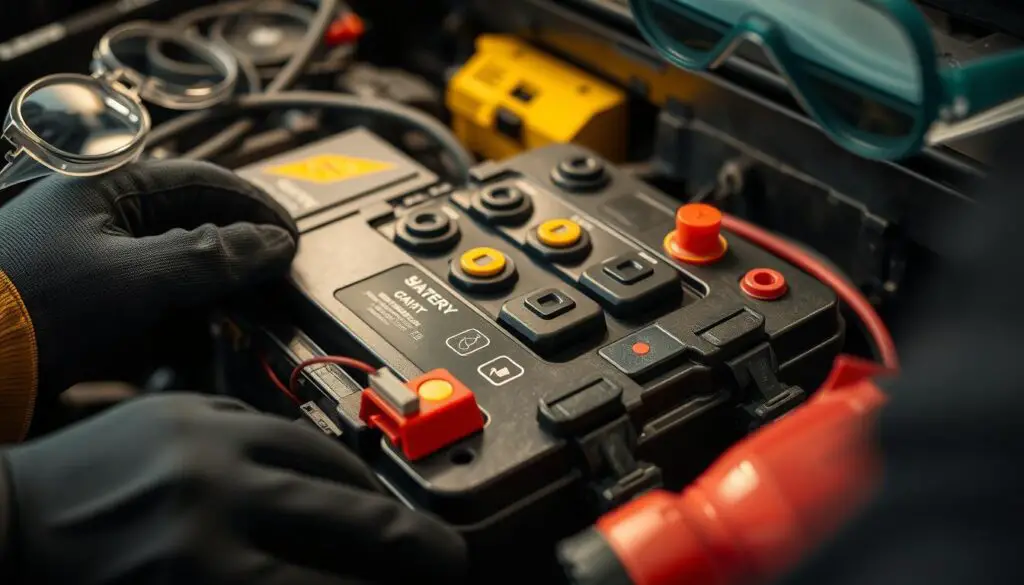
Charging a car battery needs you to know some safety tips. It’s important to watch out for overcharging risks and make sure you have good air flow. These steps help keep you and your car safe.
Risks of Overcharging
Overcharging a car battery can be dangerous. It can cause the battery to get too hot, swell, leak, or even explode. This can make the battery useless and is very unsafe.
Most smart chargers have safety features to stop overcharging. They automatically stop when the battery is full. Always keep an eye on the charging to stay safe.
Proper Ventilation Requirements
Good air flow is key when charging a battery. Charging can make harmful gases that can build up in small spaces. A place with good air flow helps keep you safe.
Open windows or doors while charging. This lets air in and makes a safer space.
| Voltage Levels | State of Charge |
|---|---|
| 12.88V | 100% |
| 12.64V | 75% |
| 12.39V | 50% |
| 12.09V | 25% |
| 11.80V | 0% |
Signs of a Failing Battery
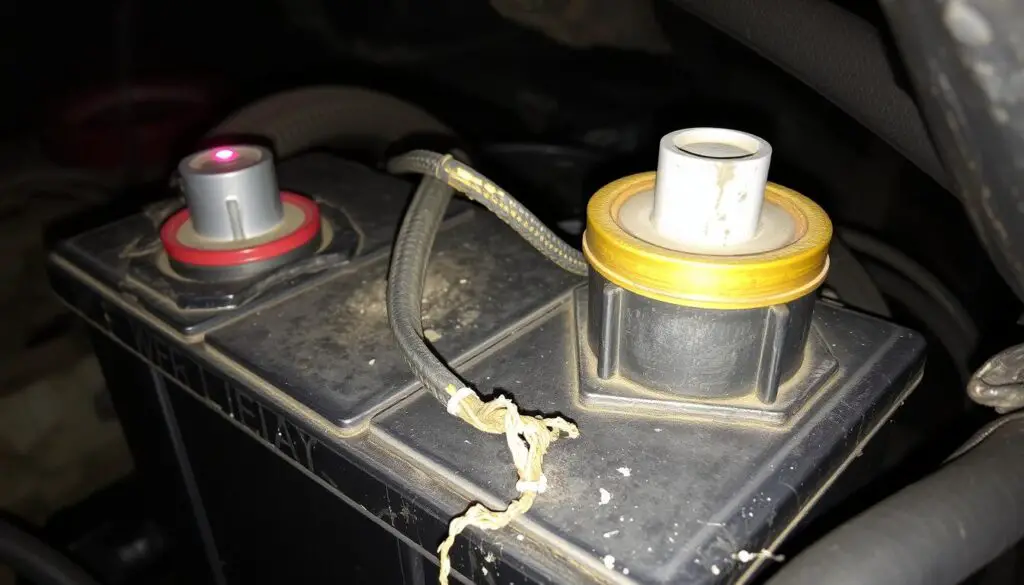
Knowing when your car battery is failing can prevent breakdowns. Spotting these signs early helps keep your car’s electrical system running well. This way, you avoid the hassle of unexpected problems.
Difficulty Starting the Engine
Having trouble starting your car could mean a battery issue. If your engine cranks slowly, it might not be holding a charge well. If you need jump starts often, it’s time to check your battery.
A good battery starts your engine quickly and easily. If it doesn’t, it’s a sign something’s wrong.
Dimming Lights
Dimming car lights are another sign of a failing battery. If your headlights seem dim or flicker, it could mean your battery is not working right. This might also point to problems with the charging system.
If your lights get brighter or dimmer when you use other car features, you need to check it out fast.
| Signs | Description |
|---|---|
| Difficulty Starting | Slow engine cranking or repeated jump starts. |
| Dimming Lights | Flickering or significantly reduced brightness of headlights. |
| Corrosion on Connectors | Blue-green powder around battery terminals indicating poor connectivity. |
| Suplhur Smell | Indicates potential battery acid leakage. |
| Physical Changes | Swelling, bulging, or irregular battery casing. |
Best Practices for Charging Your Car Battery
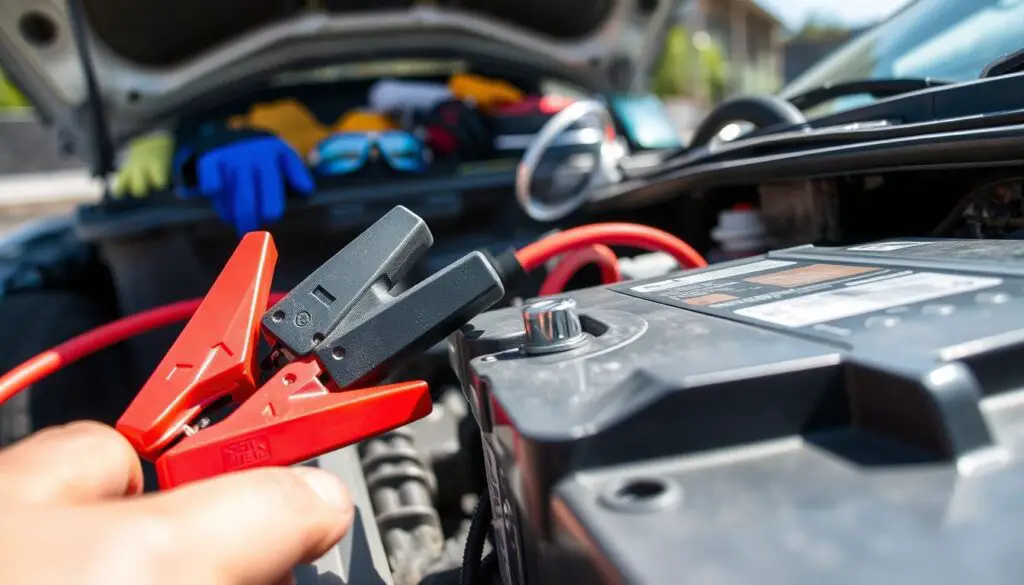
Keeping your car battery in good shape is key. It needs regular care and the right charging conditions. This helps it last longer and work better.
Regular Maintenance Checks
Regular checks are crucial for your battery’s health. Make sure the terminals are clean and connections are tight. This simple step can make a big difference.
Over 2,000 Jiffy Lube locations offer battery checks. This makes it easy for drivers to keep their batteries in top shape.
Optimal Charging Conditions
Charging your battery right is important. Charge it in moderate temperatures. Extreme heat or cold can hurt the charge.
Use a slow charge, like 10 amps, for best results. This can take 6 hours for a full charge or 8 hours for almost dead batteries. Smart chargers can also help by controlling the charge.
Make sure the charger is connected correctly. Always follow the manufacturer’s guidelines to avoid damage.
| Charging Rate (Amps) | Typical Charging Time (Hours) | Battery Capacity (Amp/Hour) |
|---|---|---|
| 10 | 6-10 | 50-60 |
| 25 | 2 | 50-60 |
By following these tips, your car will stay reliable. Regular checks and the right conditions mean a better driving experience.
When to Seek Professional Help
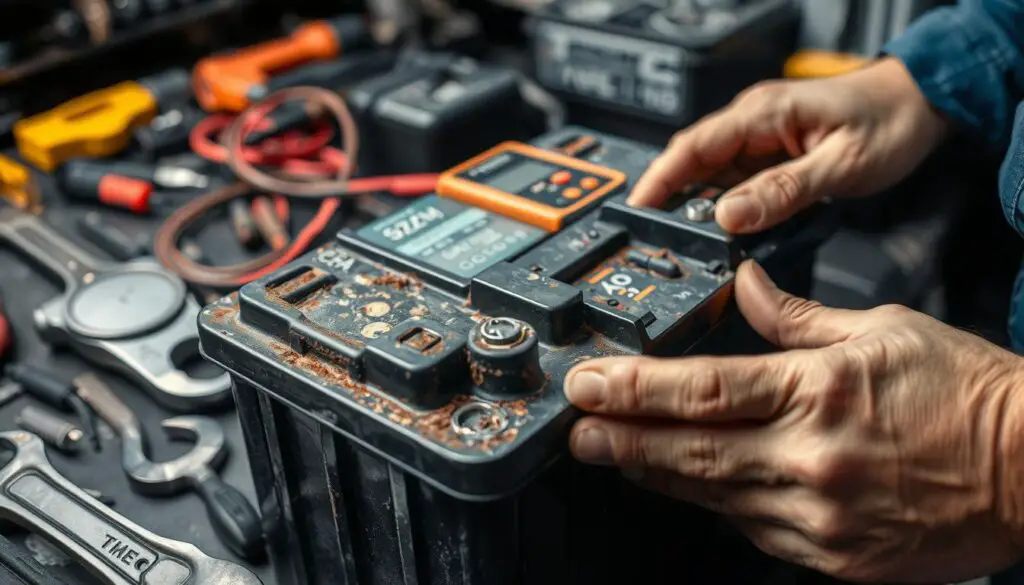
Knowing when to get help for battery problems can avoid bigger issues. Many drivers miss signs of complex battery problems. This can lead to unexpected breakdowns. It’s key to know when your battery needs a pro’s look.
Understanding Complex Issues
Complex battery problems can show up in many ways. Signs like hard engine starts or batteries draining fast need a close look. Problems with the car’s electronics can make battery issues worse. If you see these signs, getting professional help can save you time and money.
Benefits of Professional Equipment
Using professional battery tools has many benefits. Places with advanced tools can really check your battery’s health. They look at things like Open Circuit Voltage (OCV), amperage, and connections.
Having a pro do these tests gives you important info. This info helps you decide if you need a new battery. With the right care and quick action, your battery can last longer.
Conclusion: Key Takeaways on Charging Car Batteries
Knowing how to charge your car battery is key for every driver. The time it takes to charge a battery depends on many things. This includes the battery type, how you drive, and the charger you use.
For example, driving normally can recharge a battery in 30 minutes to a few hours. But, if the battery is really empty, it might take hours of driving to fill it up. Also, driving fast and using less electricity can help charge your battery faster.
It’s also vital to keep your battery in good shape. Regular checks and quick fixes can make your battery last longer. This means you won’t have to deal with sudden failures or expensive new batteries.
Watching your battery’s age and condition can save you money and time. Taking care of your battery means better performance and a smoother ride. It makes sure your car is always ready to go.
FAQ
How long does it typically take to charge a car battery?
What are the different types of car batteries?
What factors can affect my car battery charging time?
What is the difference between a standard wall charger and a high-output charger?
How long does it take to charge different types of batteries?
What are the safety precautions I should take while charging my car battery?
What signs indicate that my car battery might be failing?
How can I maintain my car battery for optimal performance?
When should I consider seeking professional help for my car battery?

Jack Thompson is a writer and seasoned auto mechanic with over 15 years of experience in the automotive industry. Known for his expertise in vehicle mechanics, Jack has a deep understanding of car and truck systems. His skills, honed through years of hands-on experience, have made him a trusted name in the field. Jack is committed to providing valuable insights into car maintenance and repair, helping vehicle owners keep their vehicles in top condition.

